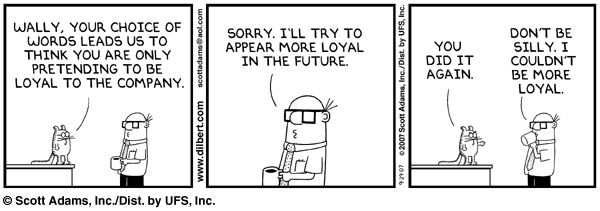September 29, 2007
Couldn't be more
A nice little exercise in the interaction of negation, modality and conversational implicature, courtesy of Dilbert:

The construction "X couldn't be more Y" has become a commonplace way to say "X is very Y", as in these examples from recent news articles:
Enter Pavlik, 25, who couldn’t be more different than those three.
When it comes to loving the triumphs and feeling passionate about the game, they couldn't be more alike.
I couldn't be more pleased.
.. these linemen couldn't be more determined not to give up sacks ...
In “If I Did It,” the analogy couldn’t be more appropriate.
The Republican nomination race, where fluidity is the name of the game, couldn't be more different.
Star reporter Linda Diebel's latest book couldn't be more timely – it's a biography,
... he couldn't be more impressed.
Calhoun couldn’t be more proud of Okafor ...
The two sides, Germany and Brazil, couldn't be more different.
These are the first ten hits for a Google News search on "couldn't be more", and it's striking that in three of them, Y is different, and in one more, it's alike. The other six values for Y are pleased, determined, appropriate, timely, impressed, proud -- all positively evaluated terms.
The next pageful of ten results couldn't be more similar:
the 1988 comedy that paired Arnold Schwarzenegger and Danny DeVito as siblings, who couldn't be more different.
I couldn’t be more pleased
100 Saints director Ethan McSweeny couldn't be more pleased that nothing stood in the way of Smith joining their team
I couldn’t be more happy with the effort our kids put forth.
The contrast in the teams’ philosophies couldn’t be more stark.
I couldn’t be more excited about finally getting images by Richard Kern on view in Chicago
... the focal points of a Bison attack that couldn't be more perfectly balanced.
The differences between these two candidates couldn't be more striking.
the cast truly loves the film and couldn’t be more proud of it.
I couldn't be more pleased with how the hospitals in the county reacted
Well, of course it could have been more similiar, really, but it was pretty close. This time we got seven positive evaluations (pleased (3), happy, excited, perfectly balanced, proud) and three same-or-different (different, contrast ... stark, differences ... striking).
But when people ask whether X couldn't be more Y, they're not asking whether X is very Y -- they're generally expressing a wish that X should change in the direction of Y. And the characteristic values of Y become rather different (though in non-ironic uses, Y of course remains positively evaluated, and predication of similarity, generally expressed as "more like so-and-so", also remains common). The first ten Google hits for "couldn't you be more":
Couldn't you be more original than that?
Why couldn't you be more like Marcia?
Couldn't you be more compassionate?
Couldn't you be more specific?
Why couldn't you be more like John Travolta?
Couldn't you be more direct about it?
Couldn't you be more reasonable and less reactionary?
couldn't you be more careful about where you put your feet just once in a while?
Couldn't you be more original?
Why couldn't you be more like "Seinfeld" or "Friends"?
And "couldn't they be more":
Why couldn't they be more up front?
Couldn't they be more user friendly ...
Could they be more original ...
why couldn't they be more like my friend?
couldn't they be more grateful?
Couldn't they be more useful actually policing ...
why couldn't they be more understanding of him?
couldn't they be more metaphorical?
Oh, why couldn't they be more like me?
Why couldn't they be more like him?
For fans of overnegation, there's a dog-that-didn't-bark problem here. If people get confused about phrases like "the importance of this position cannot be underestimated" because it's hard to process sentences that combine a modal, a scalar predicate, and a negative or two, why doesn't anyone seem to have any trouble with the likes of "I couldn't be more unhappy about this" ?
Posted by Mark Liberman at September 29, 2007 08:39 AM